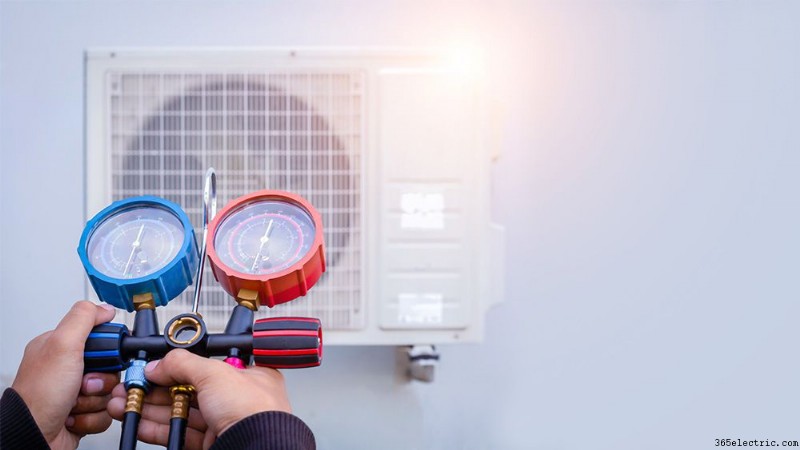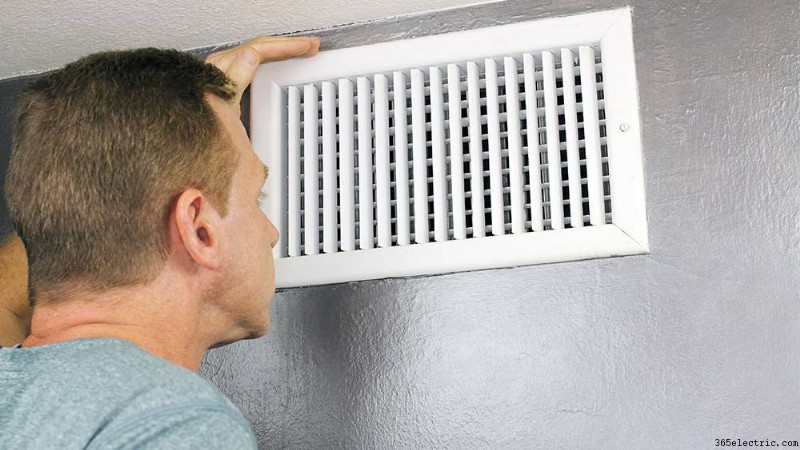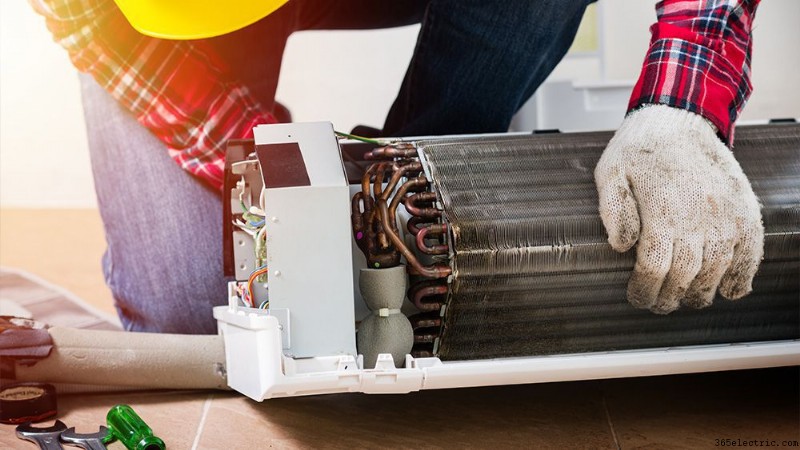Kako izgleda curenje rashladnog sredstva? 11 znakova curenja rashladnog sredstva izmjenične struje koje nikada ne smijete zanemariti

Rashladno sredstvo, također poznato kao rashladno sredstvo ili freon, nedvojbeno je najvažniji dio vašeg klima uređaja. AC rashladno sredstvo je kemijski spoj odgovoran za apsorpciju topline iz unutarnjeg zraka, izbacivanje je van i na taj način isporuku hladnog zraka. Mijenja svoje stanje iz tekućine u plin i natrag dok prolazi kroz različite komponente u vašem klimatizacijskom uređaju da isporuči hladan zrak (ili toplinu u slučaju reverzibilnog klima uređaja).
Bez obzira imate li klima uređaj s kanalima ili bez njih, on koristi rashladno sredstvo za hlađenje vaše kuće.
Ponekad rashladno sredstvo izmjenične struje može iscuriti, što ozbiljno ometa sposobnost hlađenja vaše klime. Ako vaš klima uređaj ne hladi dobro, računi su vam iznenada veći, voda kaplje ili primijetite bilo koje druge znakove navedene u nastavku, morate provjeriti curi li rashladno sredstvo iz izmjenične struje.
Ako sumnjate na curenje rashladnog sredstva ili samo želite o tome saznati unaprijed kako biste izbjegli probleme kasnije, onda je ovaj članak za vas! Istražite:
- Opasnosti od curenja rashladnog sredstva AC
- Uzroci curenja rashladnog sredstva ili AC freona
- Znakovi curenja rashladnog sredstva iz klima uređaja
- Što učiniti ako sumnjate na curenje rashladnog sredstva
- Kako spriječiti curenje AC rashladne tekućine
Opasnosti od curenja AC rashladnog sredstva
Iako freon nema okus ni miris, on utječe na nas i našu okolinu. Rashladno sredstvo koje curi štetno je za okoliš, vaše zdravlje i vašu HVAC jedinicu.
Opasnost za okoliš
Utvrđeno je da CFC oštećuju ozonski omotač, zbog čega su izbačeni iz upotrebe. Međutim, zamijenjeni su hidrofluorougljicima (HFC) i hidroklorofluorougljicima (HCFC), koji dolaze sa svojim vlastitim problemima. Oni su izuzetno snažni staklenički plinovi. Na primjer, HFC 134-a, popularno rashladno sredstvo, ima 3400 puta veći potencijal globalnog zatopljenja od ugljičnog dioksida. Dok se rashladno sredstvo R410A ili njegove nadogradnje danas prebacuju na rashladno sredstvo, mnogi klima uređaji i dalje se sastoje od freona ili HFC-a.
Sprječavanje i trenutačno popravljanje curenja rashladnog sredstva, zajedno s odgovornim zbrinjavanjem klima uređaja na kraju njegovog životnog vijeka, može uvelike pomoći u smanjenju utjecaja HVAC jedinica na okoliš.
Opasnost za ljude
Curenje freona svakako predstavlja opasnost za zdravlje, au slučaju dopunjavanja to treba učiniti samo stručnjak. Ako ste dulje vrijeme izloženi rashladnom sredstvu, možete patiti od "otrovanja rashladnim sredstvom". Iako je slučajno trovanje rashladnim sredstvom rijetko, ipak je potrebno biti svjestan mogućih opasnosti. Simptomi blagog do umjerenog trovanja rashladnim sredstvom uključuju:
- Glavobolja
- Vrtoglavica
- Povraćanje
- Mučnina
- Kašljanje
- Iritacija očiju, ušiju i grla
Kako biste izbjegli slučajno trovanje rashladnim sredstvom zbog curenja rashladnog sredstva, otklonite curenje što je prije moguće.
Teško trovanje rashladnim sredstvom uobičajeno je samo među ljudima koji koriste rashladno sredstvo kao rekreacijsku drogu i može uzrokovati gubitak svijesti, napadaje, komu ili iznenadnu smrt.
Opasnost za vaš klima uređaj
Budući da je rashladno sredstvo sredstvo za hlađenje, curenje rashladnog sredstva iz klima-uređaja može znatno naštetiti performansama vašeg klima uređaja.
Kada vaša jedinica klima uređaja ima malo freona, to opterećuje komponente vaše jedinice. Vaša klima jedinica mora više raditi kako bi postigla zadanu temperaturu, što može dovesti do kvara kompresora ako se zanemari duže vrijeme. Također može uzrokovati smrzavanje AC spirala, povećanje računa i općenito neučinkovito hlađenje.
4 uzroka curenja rashladnog sredstva ili AC freona
Brojni su uzroci curenja freona. Rashladno sredstvo nije nešto što se troši ili iscrpljuje tijekom vremena; curi zbog problema koji dovodi do malih rupa koje omogućuju izlazak rashladnog sredstva. Neki od najčešćih uzroka uključuju:
1. Istrošenost AC jedinice
Trošenje i habanje uzrokovano starenjem čest je uzrok curenja rashladnog sredstva iz klima uređaja. S vremenom spojevi i spojevi u vašem klima-uređaju mogu oslabiti i erodirati. Osim toga, gumene brtve oko servisnih ventila ili pristupnih priključaka mogu se istrošiti i uzrokovati curenje rashladnog sredstva.
Moreover, if you delay or neglect HVAC repairs and maintenance for a long time, you will face this issue sooner than expected.
2. Pinhole Leak
Also known as ‘Champagne leaks’ since they create tiny bubbles, pinhole leaks are very minute holes in your AC coils. They normally occur in older units as a result of degradation over time and the main cause is certain acids such as Formic formed by Volatile Organic Compounds (VOCs) that are generally present in the air. Products such as air fresheners, glues or paints contain VOCs making it very easy for them to reach your indoor air conditioning unit. Overtime, these can eat or corrode your AC’s copper tubing causing tiny leaks.
Due to the vulnerability of copper tubing to VOCs forming formic acid, manufacturers are starting to switch to aluminum coils.
3. Vibrations
Your compressor motor, located outside, is an important component of your AC. If your outdoor unit is improperly sealed, it can generate severe vibrations, weakening refrigerant lines. Moreover, if your refrigerant lines were improperly installed in the first place, even mild vibration caused by the system’s running could wear holes in the copper coils, leading to an AC refrigerant leak.
4. Physical Damage
Children, animals, and lawnmowers have the potential to cause damage to your outdoor unit. In addition, lawnmowers can project their cuttings towards the outdoor unit, leading to debris build-up. Children and animals can accidentally hit or throw something while playing. This can also cause all sorts of physical damage. To prevent any damage to your outdoor AC unit, surround it with a block wall or install it higher up.
Read our guide to learn how to hide the air conditioner unit outside.
11 Signs of an AC Refrigerant Leak
Has your AC been acting up recently, and you can’t figure out why? If your AC isn’t turning on or its performance has taken a hit, a leaking refrigerant might be the cause to blame. Here are some signs your AC may have an air conditioner coolant leak:
1. Decreased Cooling Ability
The refrigerant absorbs heat from your home and releases it outside. If you have low refrigerant levels, effective heat transfer cannot take place. Thus, if your air conditioner has suddenly lost its cooling ability and doesn’t narrow down to any other cause, a refrigerant leak may be to blame.
2. AC Not Blowing Cold Air

A quick test is to place your hand right in front of your vents. If the air coming from the vents feels warm and you’ve tried everything to fix it but failed, then your AC could have a Freon leak.
3. Long Cooling Cycles
When your AC has a refrigerant leak, it often has a harder time reaching the set temperature on the thermostat. As a result, your HVAC unit must run longer than usual to achieve the desired temperature. If you notice your air conditioner is taking too long to reach a certain temperature, it’s best to get it checked.
4. Low Airflow
Place your hand directly in front of your AC vents. If the air is cold, but the airflow is too low, you may have a refrigerant leak. An air conditioner with a coolant leak cannot produce as much cold air as normal. While there may be many causes behind poor HVAC airflow, it may be due to a leak if everything else seems fine.
5. Unexpectedly High Electricity Bills
Due to a lack of coolant, your AC needs to work harder to cool your room effectively, leading to higher electricity bills.
If your electricity bills have skyrocketed despite no change in consumption, an HVAC refrigerant leak could be to blame. Increased bills indicate your AC is working longer than normal to reach your desired thermostat settings.
6. Frozen Evaporator Coils

Notice your AC freezing up even at the peak of summer? When refrigerant levels are too low, the evaporator coils cannot absorb heat adequately. As a result, the condensation on the coils freezes. Thus, ice crystals on the evaporator coils are often the result of a refrigerant leak.
7. AC Leaking Water
When your AC stops running, the frozen condensation on the evaporator coils melts, and water drips on the floor. If you didn’t notice you had frozen evaporator coils, a puddle of water on the floor near your HVAC unit is also indicative of a refrigerant leak.
8. Increased Indoor Humidity
Dehumidification is a natural result of your air conditioner’s cooling process. A fully functional air conditioner begins to offer serious dehumidification benefits after 15 minutes of runtime. Thus, if your house suddenly feels humid, it’s a sign you have a refrigerant leak.
9. Hissing or Bubbling Sounds
A refrigerant leak is the result of tiny holes or cracks in the coils. When coolant leaks through these holes, due to its high pressure, it produces a hissing noise. If the leak is large enough, there may even be a bubbling or gurgling noise coming from your unit.
10. Tiny Bubbles in the Evaporator Coils
If your evaporator coil has tiny holes through which it is leaking refrigerant, you can detect them by a collection of tiny bubbles near the leak. These are also known as “champagne leaks” due to the presence of tiny bubbles.
11. A Sweet or Chloroform-Like Smell
Your sense of smell can be your strongest ally when attempting to diagnose problems with your air conditioner. Odd smells from your air conditioner often signal a deeper problem.
For example, most refrigerants have a sweet or chloroform-like odor. If you smell any of those, it’s time to contact a professional. However, some refrigerants are completely odorless, so keep an eye out for other signs as well.
What to Do if You Suspect a Refrigerant Leak?
Since refrigerant leaks can be hazardous, never attempt to fix them yourself. Always leave it to a certified HVAC professional. Be wary of any professionals who recharge the refrigerant without finding the source of the leak and fixing it.
The leak will reoccur, leading to expensive repairs in the future. A qualified technician will also be able to judge whether your air conditioner needs to be replaced or if it is worth fixing the leak.
How to Prevent a Refrigerant Leak?
Over time, pollutants and debris can build up on your coils, leading to the formation of formic acid. Formic acid can create holes in copper coils, leading to your air conditioner leaking refrigerant. Therefore, regularly cleaning your AC coils is the first step towards preventing an AC refrigerant leakage.
While refrigerant leaks mostly occur due to age-related wear and tear, you can still take some steps to prevent them. One of these is regular maintenance of your HVAC unit. Schedule annual maintenance, especially before the summer and winter seasons, to identify and repair any issue beforehand.
Though coolant leaks can put a damper on your AC’s performance, you shouldn’t be too worried. Once you know how to detect a refrigerant leak, you can easily contact an HVAC professional to fix it. Your AC will be up and running in no time! Just make sure it doesn’t get ignored for too long otherwise, you could end up with a bigger, more expensive problem.
